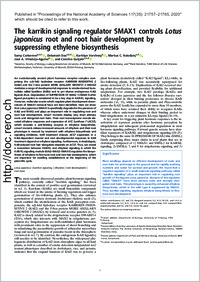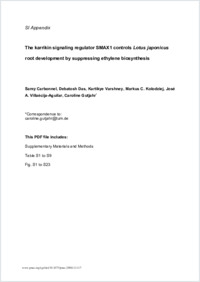The karrikin signaling regulator SMAX1 controls Lotus japonicus root and root hair development by suppressing ethylene biosynthesis
- Carbonnel, Samy Genetics, Faculty of Biology, Ludwig Maximilian University of Munich, 82152 Martinsried, Germany - Plant Genetics, TUM School of Life Sciences Weihenstephan, Technical University of Munich, 85354 Freising, Germany - Department of Biologiy,University of Fribourg, Switzerland
- Dasa, Debatosh Plant Genetics, TUM School of Life Sciences Weihenstephan, Technical University of Munich, 85354 Freising, Germany
- Varshney, Kartikye Plant Genetics, TUM School of Life Sciences Weihenstephan, Technical University of Munich, 85354 Freising, Germany
- Kolodziej, Markus C. Genetics, Faculty of Biology, Ludwig Maximilian University of Munich, 82152 Martinsried, Germany
- Villaécija-Aguilar, José A. Plant Genetics, TUM School of Life Sciences Weihenstephan, Technical University of Munich, 85354 Freising, Germany
- Gutjahr, Caroline Genetics, Faculty of Biology, Ludwig Maximilian University of Munich, 82152 Martinsried, Germany - Plant Genetics, TUM School of Life Sciences Weihenstephan, Technical University of Munich, 85354 Freising, Germany
-
01.09.2020
Published in:
- Proceedings of the National Academy of Sciences. - 2020, vol. 117, no. 35, p. 21757–21765
English
An evolutionarily ancient plant hormone receptor complex comprising the α/β-fold hydrolase receptor KARRIKIN INSENSITIVE 2 (KAI2) and the F-box protein MORE AXILLARY GROWTH 2 (MAX2) mediates a range of developmental responses to smoke-derived butenolides called karrikins (KARs) and to yet elusive endogenous KAI2 ligands (KLs). Degradation of SUPPRESSOR OF MAX2 1 (SMAX1) after ligand perception is considered to be a key step in KAR/KL signaling. However, molecular events which regulate plant development downstream of SMAX1 removal have not been identified. Here we show that Lotus japonicus SMAX1 is specifically degraded in the presence of KAI2 and MAX2 and plays an important role in regulating root and root hair development. smax1 mutants display very short primary roots and elongated root hairs. Their root transcriptome reveals elevated ethylene responses and expression of ACC Synthase 7 (ACS7), which encodes a rate-limiting enzyme in ethylene biosynthesis. smax1 mutants release increased amounts of ethylene and their root phenotype is rescued by treatment with ethylene biosynthesis and signaling inhibitors. KAR treatment induces ACS7 expression in a KAI2-dependent manner and root developmental responses to KAR treatment depend on ethylene signaling. Furthermore, in Arabidopsis, KAR-induced root hair elongation depends on ACS7. Thus, we reveal a connection between KAR/KL and ethylene signaling in which the KAR/KL signaling module (KAI2–MAX2–SMAX1) regulates the biosynthesis of ethylene to fine-tune root and root hair development, which are important for seedling establishment at the beginning of the plant life cycle.
- Faculty
- Faculté des sciences et de médecine
- Department
- Département de Biologie
- Language
-
- English
- Classification
- Biological sciences
- Other electronic version
- License
-
License undefined
- Identifiers
-
- RERO DOC 329612
- DOI 10.1073/pnas.2006111117
- Persistent URL
- https://folia.unifr.ch/unifr/documents/308942
Other files
Statistics
Document views: 125
File downloads:
- pdf: 267
- Supplementary material: 161

